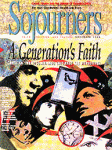Though the North American movement for justice in Central America has been well-documented through social and political histories, less work has been done on the ways the movement has transformed the hearts and souls of the people of the United States. The lives of many North Americans—myself included—were radically changed through contact with the struggle of the people of Central America during the 1970s and ’80s. Each of us can name those whose lives were inspired by songs of the pueblo, moved by the poetry of conscientized priests, humbled by the holy paintings of peasants from Solentiname, and turned upside-down through personal encounters with Central American individuals.
Demetria Martinez, a columnist for National Catholic Reporter and a poet, lays the groundwork for such a history of personal transformation in her first novel, Mother Tongue. Filled with beautifully turned phrases and profound reflections on the recent history of Central America, this book tells the story of a woman whose heart was shaped, broken, and resurrected when circumstances lead her to fall in love with a war refugee from El Salvador and into a lifelong intimacy with the pursuit of truth.
Maria was a young Chicana who barely spoke Spanish when she had her love-at-first-sight experience with José Luis as he disembarked a plane in Albuquerque. In the pursuit of her lover’s heart, she comes face to face with the deep scars of war in the dark places of his soul and attempts to exorcise the enormity of his pain with her affection. In the process, María gains the inner experience that pushes her into a new life far beyond what she might have known if she had not taken the risky leap of love.
María’s romantic illusions about José Luis and the nature of their love continually run up against reality in this book. And though José Luis is somewhat more experienced at love, his own biased misconceptions of who North Americans are and what they want sabotage his relationship with María from the start.
Our illusions about loved ones often reveal more about our own needs and desires than they reflect the true nature of our partners and companions on the journey. Not everything these illusions tell us should be believed, but there is a kernel of truth about ourselves contained in them that is important for us to learn.
MOTHER TONGUE IS firmly set in the midst of the Salvadoran conflict, but it is far more than a story about the war there. It also teaches us to battle against our own inner poverty, to stand up to the loneliness each of us faces, and to fight without ceasing in the struggle to find the hidden meaning in our lives. This is a story of love from the heart that floats sensuously like a dream and breathes to life the theoretical bones of liberation theology.
Mother Tongue also shows us how raising children can renew our lives and give new reasons to share the story of Life with them. Through María’s love for her and José Luis’ child, she shows how important it is to pass on values and idealism to the younger generation in order for the struggle for justice to continue. It helps dispel our messianic delusion that the existence of peace and justice in this world depends on us alone—rather, it is the work of each generation to seek it for themselves.
The winner of the 1994 Western States Book Award for Fiction, Mother Tongue reminds us that—whether we find ourselves speaking the whispers of love, exhortations to our children, or the gritos of political struggle—our first language must be that which comes from the heart.

Got something to say about what you're reading? We value your feedback!